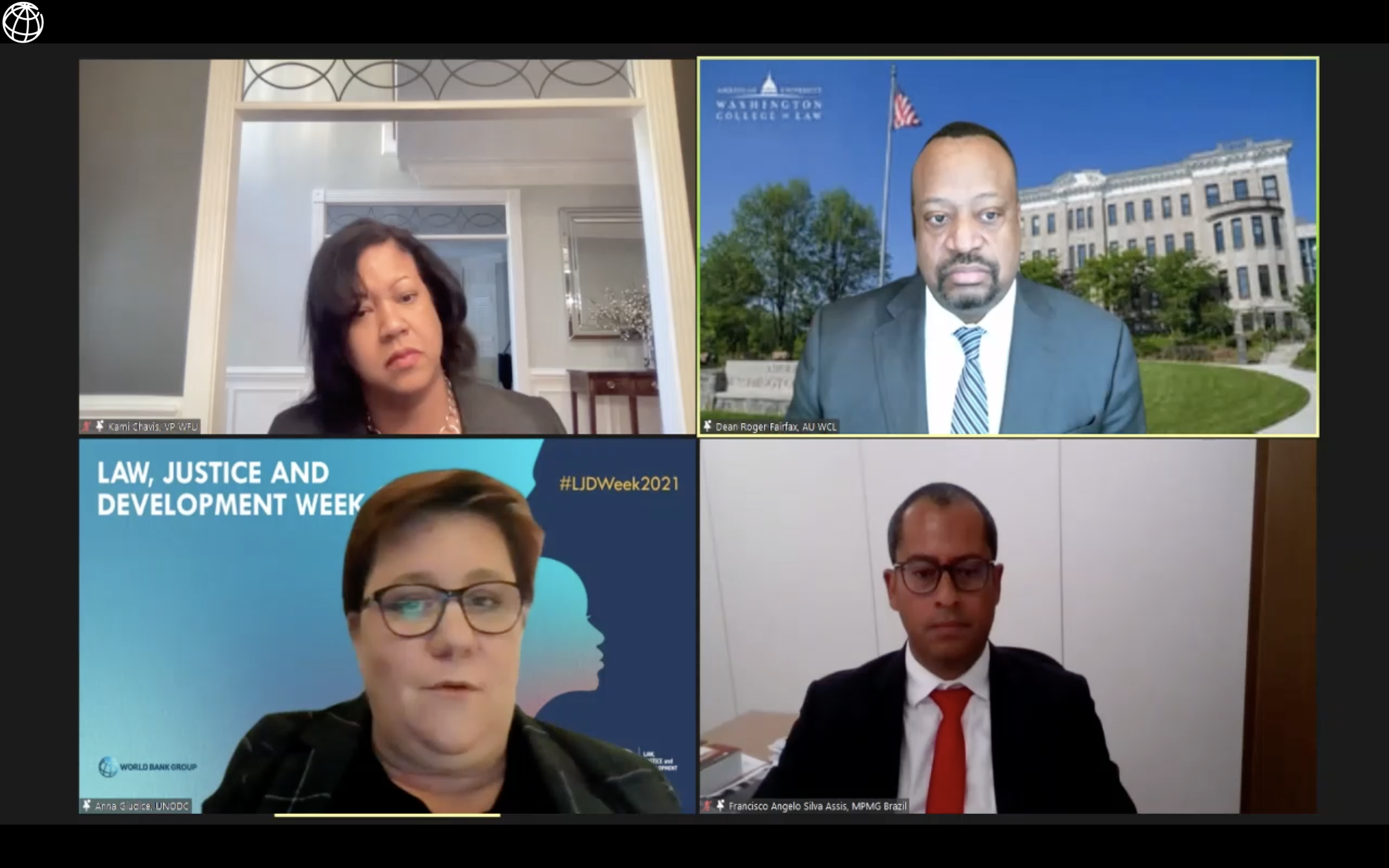
AUWCL Dean Roger Fairfax at the World Bank’s Law, Justice and Development Week 2021
This year’s World Bank’s Law, Justice and Development Week 2021 has brought together a number of world-renown experts to discuss about the advancement of the fight against racial discrimination in countries around the world. The Week was held under the title “Poverty and Racial Equity in the Criminal Justice System: Fostering Development through Access to Justice.” AUWCL’s Program on International Organizations, Law and Development contributed to the World Bank’s Week by securing the participation of Dean Roger Fairfax, a prominent scholar on racial equality, to provide the introduction and to moderate a panel on “Police Use of Force and Reform.” Joining Dean Fairfax, the panel featured Kami Chavis, Vice Provost, Professor of Law, and Director of the Criminal Justice Program at Wake Forest University; Francisco Angelo Silva Assis, State Prosecutor at Minas Gerais (Brazil); and Anna Giudice, Police Reform Team Leader at the United Nations Office on Drugs and Crime, and Lead on Criminal Justice Pillar, UN Network on Racism Discrimination and Protection of Minorities.
In his introductory remarks, Dean Fairfax listed some recent victims of police brutality in the United States, and put emphasis on the events that led to the death of George Floyd. He pointed out that police brutality and the fight against racial discrimination within the police also concern the United Nations, as this subject matter is not only a problem in the United States, but globally. He acknowledged the global nature of this problem and that it is so necessary to encourage a transnational dialogue on these matters.
Following up to these comments, Anna Giudice explained the international standards for police use of force. These allow using force only under the following conditions: when provided by national law (principle of legality), when necessary to achieve a legitimate policing objective (principle of necessity), and within the framework of the principle of precaution, non-discrimination, and accountability. Force may be used in defense or to prevent the perpetration of a crime that could result in the loss of life. She also recognized that policing during the pandemic has led to increased instances of excessive use of force. She also indicated that the United Nations High Commissioner’s report following the death of George Floyd has openly laid out that people of color in the U.S. are more than twice as likely to get shot or die from stops and searches and police custody than their white counterparts.
Francisco Angelo Silva Assis explained the efforts in Minas Gerais to cope with the legacy of slavery and its impact on racial profiling even in the current times, long after Brazil abolished slavery. He offered insights on the statistical evolution of deaths from police brutality in this state.
Dean Fairfax then turned to Kami Chavis to ask how could governments act against police brutality. She explained that more diverse police leadership is not necessarily a solution to police brutality against people of color. The issue is rather one of police culture in the sense of violence being deemed necessary to “do the job” and a lack of accountability and supervision. There is also an important degree of group loyalty among members of the police force. Many police officers in “dangerous situations,” when they see something wrong, rely on the “Blue Code of Silence.” The duty to intervene upon police officers may be a good policy, but she insisted that a more profound change of culture has to happen to overcome that code of silence.
Possible solutions, as suggested by Anna Giudice, include the creation of a police index that focuses on algorithms and data to establish police accountability. The police should also recognize that it is not possible to simply deny the problem surrounding racial disparities, and instead pursue justice and impunity and build trust. United Nations member states should confront past legacies to help address racial injustice and police use of force and reform. She also mentioned that more emphasis should be put in collecting and keeping data on police practices by implementing monitoring systems. There should also be established independent police oversight bodies with independent oversight functions and investigative and prosecutorial authority. The traditional gender imbalance should be addressed, as this has also a strong influence on police culture. She also mentioned the usefulness of the Mendez principles for more effective and efficient police interviewing methods, as that might help in providing a positive impact on preventing torture and forced confessions.
Francisco Silva agreed with Anna Giudice that the main challenge is the police culture, which is very deeply embedded in police structures at all levels. The public prosecutors have sometimes an opportunity to monitor the work of the police. The Attorney General’s office may gain the authority to sue for injunctive relief local police departments that have shown a pattern of unconstitutional police practices.
Dean Fairfax reminded that in the U.S. the draft legislation following the George Floyd incident stalled in the Senate after initial House approval (George Floyd Justice in Policing Act). Kami Chavis highlighted that this Act would be key to limit police brutality. She pointed out that while on the federal level there are difficulties in passing legislation, on the state level many laws and other regulations have been adopted to curtail police brutality.
The panelists concluded that the analysis of other countries’ experience with policing models could be very useful to build a police force better integrated in the community. As just one example of comparative experiences from other countries, it should not be presumed that it is necessary that the police force always carries firearms during its work. In addition, the information that should be exchanged does not only have to refer to legislation, but also to more specific information and experiences. Finally, the panelists also highlighted the usefulness of a long-term observation of developments.